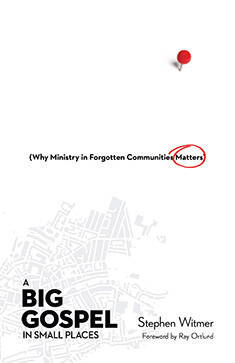Ministry in urban areas has been heavily prioritized in recent years. Partly in response to this, Stephen Witmer’s A Big Gospel in Small Places: Why Ministry in Forgotten Communities Matters provides a theological framework for ministry in smaller/rural areas. Witmer doesn’t suggest that such ministry is more important than urban or suburban ministry, or that everyone should do rural ministry. He does argue, however, that there is something about the gospel itself that encourages us not to bypass the seemingly smaller and less important places of the world.
I could say much about this book in the way of praise, but my task here is simply to give a brief description of the book. After a brief introduction outlining his own journey arriving at a rural context, Witmer tackles three topics in the book. First, Part One describes what “small places” are like. Witmer notes the increasing interest in rural locations since the 2016 election, pointing out that nearly half the world’s population is concentrated in rural areas. He clarifies that what he means by “small places” is not necessarily just “rural,” but countryside and communities that are relatively small in population, influence, and economic power (ch. 1). Witmer then lays out various ways in which small places are both better (ch. 2) and worse (ch. 3) than we think. It is clear from his description that Witmer does not have a naïve or whitewashed view of the challenges of ministry in small places, and yet he is burdened that we see them and value them as God does. We must neither romanticize nor despise this kind of ministry.
In Part Two, Witmer offers a theological vision for ministry in small places. Churches exist to display the glory of the God, and small churches can contribute uniquely to this end (ch. 4): “some precious facets of the gospel will be seen more clearly in a small church than anywhere else” (p. 74). Witmer emphasizes that the gospel itself is lavish and often “unstrategic” by worldly metrics (ch. 5).Witmer recognizes that there are many bad reasons for being content with smallness (complacency, laziness, fear, etc.). He is careful not to downplay the value of careful missiological planning, but argues that all such planning must be subordinated to the interests of the gospel itself.
Witmer recognizes that there are many bad reasons for being content with smallness (complacency, laziness, fear, etc.). He encourages those ministering in small places to pray for revival and growth. At the same time, God’s pathway to lasting fruitfulness is often different than we think. There are unique benefits to ministering in small places, and there can be wisdom in accepting a slower pace of ministry. We must think spiritually and theologically about size (ch. 6) and pace (ch. 7): many of the reasons we want size and speed come from pride or envy. Witmer’s balanced approach to growth encourages us to check our motives: we should “long more for the numerical growth of your church but . . . need it less” (p. 97, italics his).
Witmer pushes back against some proposals of a “regional vision” of rural ministry which focus on the county rather than the town for the sake of greater growth (ch. 8). He encourages rural churches to embrace their context and consider how the gospel can bear special fruit by being contextualized within it. His church’s vision is “lots of churches close to people” (p. 119), which will mean church planting, collaboration among churches, and more of a long-term vision. “If we had to choose, we’d rather be a small church that plants small churches than a large church that draws people in our region away from their local communities” (p. 120). Part Two concludes with a practical chapter on battling joy-killers in rural places, particularly discontentment, envy, fear, and loneliness (ch. 9).
In Part Three, Witmer helps his readers consider whether ministry in small places is for them. Important here is the issue of motive. Witmer catalogues good and bad reasons both for doing ministry in small places (ch. 11) as well as for avoiding it (ch. 10).Witmer helps his readers consider whether ministry in small places is for them. Important here is the issue of motive. His discussion is balanced by a variety of considerations, ultimately encouraging his readers to have a humble openness and responsiveness to God’s call: “neither inertia’s tug nor ambition’s pull lead to the confident joy and kingdom effectiveness of God’s call” (p. 144).
An important part of this section of the book and the book as a whole is Chapter Twelve, where Witmer interacts with three reasons commonly given for prioritizing urban ministry. He first questions the historical claim that Paul and the apostles prioritized urban ministry, drawing on the scholarship of Eckhard Schnabel to present a more complicated picture of the New Testament paradigm. Second, he interacts with the argument that reaching cities is more effective because they create culture. Witmer does not dispute the fact that cities are cultural centers, but he argues that the broad, indirect cultural influence of cities cannot replace the value of personal, face-to-face ministry. Furthermore, the cultural influence of cities tends to be greater on suburbs than on rural areas, which are often more isolated from (and misunderstood by) city-dwellers. All this suggests a more complicated picture that tempers (though does not negate) the importance of urban ministry.
Finally, Witmer interacts with the eschatological argument that the heavenly future of God’s people in Revelation 21–22 is in a city. Witmer grants that Revelation 21–22 establishes God’s value of cities, but raises questions about how this should inform our missiological planning in the present. Ultimately, Witmer hopes that ministry in larger and smaller places (and everything in between) will be equally prioritized: “I’d prefer to speak about the crucial importance of big-place ministry and the crucial importance of small-place ministry (and all the places in between) without prioritizing either one” (p. 179).
In a brief conclusion, Witmer again returns to the question of motive, and the importance of love: “at the heart of every successful ministry, in communities of every conceivable size, is love: love for Christ and for the places where he has called us. When we truly love a particular place and the people who live there, we won’t seek to transcend it—instead, we will gladly give our lives to it” (p. 183).








Comments
Be the first one to make a comment!